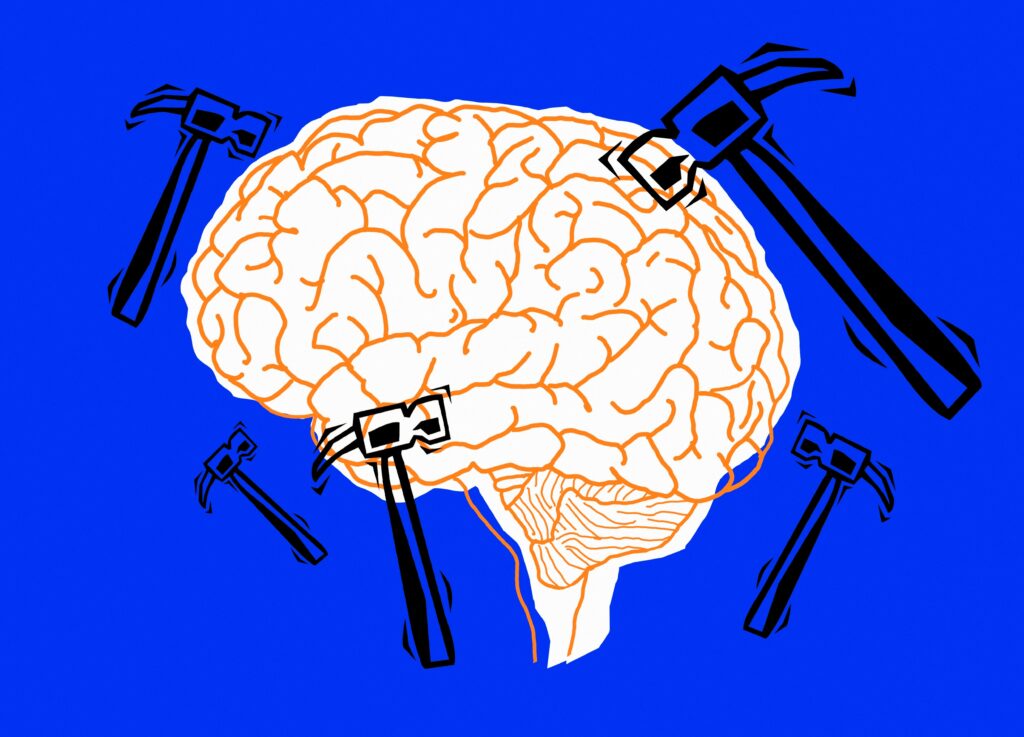When Jamie Kearney, a 35-year-old from Kentucky, gets a migraine attack, she has to clear her entire day. First, she feels exhausted. Then, out of nowhere, she’s hit with intense dizziness, nausea, and head pain so severe she can hardly open her eyes. Eventually, with the help of her triptan medication, the symptoms lift—but she’s not in the clear: It takes her half a day—occasionally, an entire day—to feel functional again. “My attacks literally just drain me,” Kearney tells SELF. “Afterward, I feel like I’ve been out all night long partying until four in the morning, but I haven’t even touched a drink.”
Roughly 80% of people with migraine experience a postdrome phase, or “migraine hangover.” During an attack, your brain goes through a bunch of abnormal changes that can cause problems even when the throbbing itself stops, leading to fatigue, neck or muscle stiffness, and difficulty concentrating for hours or even days. “The post-head-pain period is really unbearable for a lot of people,” Noah Rosen, MD, a neurologist with Northwell Health in Great Neck, New York, tells SELF.
If this sounds familiar, it’s crucial to show yourself some love before, during, and after the pain hits—doing so can help you recover sooner and avoid another brutal attack. Here’s how to care for yourself during a migraine hangover, according to experts.
1. Sip water and eat simple foods.
Dr. Rosen recommends focusing on drinking enough fluids, as dehydration, which can be a migraine trigger for some people, can also exacerbate the nausea, crappy mood, fatigue, and poor concentration that often happens during the postdrome period. Plus, if you experienced nausea and vomiting during an attack, your hydration is probably not where it should be. Kearney usually feels parched during her migraine hangover because she can’t eat or drink anything once her head starts throbbing—and she vomits a ton too. For her, replenishing fluids improves the lingering symptoms: “I swear by it,” she says. Though everyone’s fluid intake needs are different, it’s important to sip, rather than gulp, throughout the day: Aim for your pee to be a clear-ish yellow. (Caffeine can sometimes make migraine symptoms better or worse, so rely on a doctor’s guidance there.)
During attacks, many people experience gastroparesis, which means food doesn’t move as quickly as it should from your stomach to your intestines—and this can make you feel like you need to puke; as a result, it’s difficult to stay fueled. Though you might not have a strong appetite, try to eat simple, easy-to-digest snacks and meals, like soups, lean fish or poultry, white bread or pasta, and puréed veggies. Avoid foods with a lot of fiber or fat, which can slow down digestion.
2. Give yourself permission to couch-rot.
If an attack just beat you up, it’s important to rest and avoid overextending yourself, Vanessa Cooper, MD, a neurologist with Yale Medicine, tells SELF: Research shows that getting a good night’s sleep after an episode can help restore your brain function (and, as we explained above, your body just went through it). Try, if possible, to get at least eight hours the night after an attack and do your best to go to bed and wake up at your regular times, Dr. Cooper says. (Here are some ways to sleep better when you live with migraine.)
>>> Read full article>>>
Copyright for syndicated content belongs to the linked Source : Self.com – https://www.self.com/story/migraine-hangover-treatment
